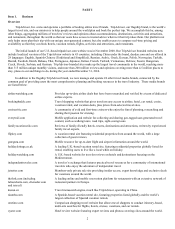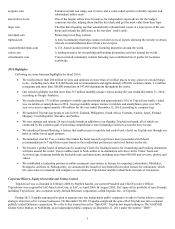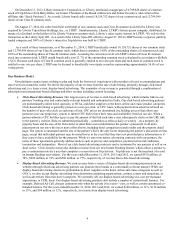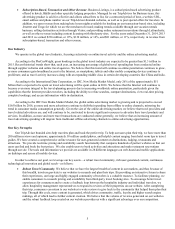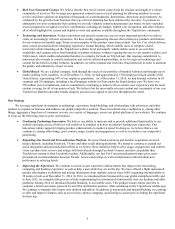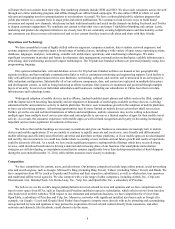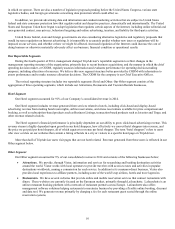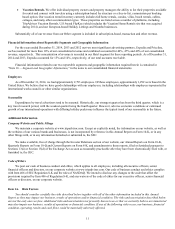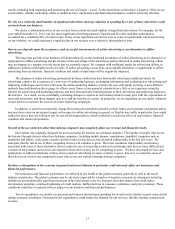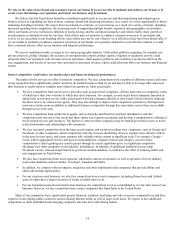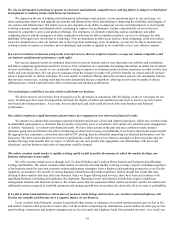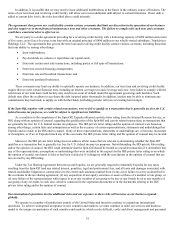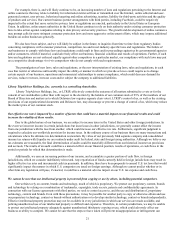TripAdvisor 2014 Annual Report Download - page 22
Download and view the complete annual report
Please find page 22 of the 2014 TripAdvisor annual report below. You can navigate through the pages in the report by either clicking on the pages listed below, or by using the keyword search tool below to find specific information within the annual report.12
If we are unable to continue to increase visitors to our websites and to cost-effectively convert these visitors into repeat users or
contributors, our advertising revenue could decline.
The primary asset that we use to attract visitors traffic to our websites and convert these visitors into repeat users is our
continued ability to collect, create, organize and distribute high-quality, commercially valuable content that meets user’s specific
interests and enables them to share and interact with the content and supporting communities. There can be no assurances that we will
continue to obtain content in a cost-effective manner or in a manner that meets rapidly changing consumer demand. Any failure to
obtain such content or organize and distribute such content in a manner that will engage users, or a failure to provide products that are
perceived as useful, reliable and trustworthy, could adversely affect user experiences and reduce traffic driven to our websites, which
would make our websites less attractive to advertisers. Any change in the cost structure pursuant to which we obtain our content, or in
travelers’ relative appreciation of user-based versus expert content or our user-based content versus other sites’ user-based content,
could also reduce traffic driven to our websites which would negatively impact our business and financial performance.
We derive substantially all of our revenue from advertising and any significant reduction in spending by advertisers could harm
our business.
We derive substantially all of our revenue from the sale of advertising, primarily through click-based advertising and, to a lesser
extent, display-based advertising. While we enter into master advertising contracts with our partners, these agreements generally
address matters such as privacy and compliance, payment terms and conditions, termination and indemnities. Most of our click-based
advertising contracts can be terminated by our partners at will or on short notice. Our ability to grow advertising revenue with our
existing or new advertising partners is dependent in large part on our ability to generate revenue for them. Advertisers will not
continue to do business with us if their investment in such advertising does not generate sales leads, customers, bookings, or revenue
and profit on a cost-effective basis, or if we do not deliver advertisements in an effective manner. If we are unable to provide value to
our advertisers, they will likely stop placing ads on our websites, which would harm our revenues and business. We cannot guarantee
that our current advertisers will fulfill their obligations under existing contracts, continue to advertise beyond the terms of existing
contracts or enter into any additional contracts with us.
Click-based advertising accounts for the majority of our advertising revenue. Any changes we make to our business model may
impact our advertising revenue in ways that we do not expect. If our partners do not receive the benefits they expect from their
advertising spend with us, they may reduce their spending. In addition, if new, more effective advertising models were to emerge,
there can be no assurance that we will have the ability to offer these models, or offer them in an effective manner.
Furthermore, our CPC pricing for click-based advertising depends, in part, on competition between advertisers. If our large
advertisers become less competitive with each other, merge with each other or with our competitors, focus more on per-click profit
than on traffic volume, or are able to reduce CPCs, this could have an adverse impact on our click-based advertising revenue which
would, in turn, have an adverse effect on our business, financial condition and results of operations.
Expenditures by advertisers also tend to be cyclical, subject to variation based on budgetary constraints, project cancellation or
delay, and to reflect overall economic conditions and buying patterns. If we are unable to generate advertising revenue due to factors
outside of our control, our business and financial performance would be adversely affected.
Our businesses could be negatively affected by changes in search engine algorithms and dynamics, or search engine
disintermediation.
We rely heavily on Internet search engines such as Google, both for organic traffic and through the purchase of travel-related
keywords, to generate traffic to our websites. We obtain a significant amount of traffic via search engines and, therefore, utilize
techniques such as SEO and SEM to improve our placement in relevant search queries. Search engines, including Google, frequently
update and change the logic that determines the placement and display of results of a user’s search, such that the purchased or
algorithmic placement of links to our websites can be negatively affected. Moreover, a search engine could, for competitive or other
purposes, alter its search algorithms or results causing our websites to place lower in search query results. If a major search engine
changes its algorithms in a manner that negatively affects our paid or unpaid search ranking, or if competitive dynamics impact the
effectiveness of SEO or SEM in a negative manner, our business and financial performance would be adversely affected, potentially to
a material extent. Furthermore, our failure to successfully manage our SEO and SEM strategies could result in a substantial decrease
in traffic to our websites, as well as increased costs if we were to replace free traffic with paid traffic.
In addition, to the extent that Google (including Google + Local and Google Hotel Finder) and Bing (including Bing Travel), or
other leading search or metasearch engines that have a significant presence in our key markets, disintermediate OTA’s or travel
content providers by offering comprehensive travel planning or shopping capabilities, or refer those leads to suppliers directly, or to
other favored partners, there could be a material adverse impact on our business and financial performance. For example, during 2012,
Google completed its acquisition of flight search technology company ITA Software and separately made changes to its hotel search


